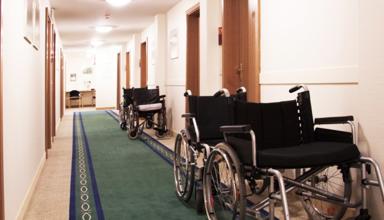Article by Stephen Boyce, National Assembly for Wales Research Service
This week, 6-12 June is Carer’s Week, an annual event that highlights the contribution of unpaid carers. According to the 2011 Census there are 370,230 carers in Wales, nearly 30 per cent of whom provide more than 50 hours of care a week. [caption id="attachment_6684" align="alignright" width="239"] Image from Flickr by ColaLife CARE Logo. Licensed under the Creative Commons.[/caption] Many carers pay a price for their commitment in terms of their health and wellbeing and some experience financial difficulties and social isolation. The focus of this year’s Carers’ Week campaign is on carer friendly communities, the aim being to encourage the development of communities in which carers feel supported and are recognised as individuals with needs of their own. A research report published by Carers UK this week highlights some of the barriers carers experience when accessing healthcare, employment and education. It says 3 in 4 carers don’t feel their caring role is understood and valued by their community.
Image from Flickr by ColaLife CARE Logo. Licensed under the Creative Commons.[/caption] Many carers pay a price for their commitment in terms of their health and wellbeing and some experience financial difficulties and social isolation. The focus of this year’s Carers’ Week campaign is on carer friendly communities, the aim being to encourage the development of communities in which carers feel supported and are recognised as individuals with needs of their own. A research report published by Carers UK this week highlights some of the barriers carers experience when accessing healthcare, employment and education. It says 3 in 4 carers don’t feel their caring role is understood and valued by their community.
As the new Welsh Government and the Fifth Assembly get underway, new policies and legislation are beginning to affect carers in Wales. The Welsh Government intends to refresh its Carers’ Strategy this year, and the Social Services and Well-being (Wales) Act 2014 (SSWB Act) is now in force, with implications for the kinds of support carers will receive. The SSWB Act repealed the Carers Strategies (Wales) Measure 2010 which caused some disquiet amongst carers’ organisations. When introduced, the Measure was seen as an important development for carers whose interests had previously been promoted by a number of parliamentary acts of varying impact. The new requirement in the Measure to develop carers’ strategies would, it was hoped, help to ensure carers’ needs were not overlooked by public services. The SSWB Act creates a duty on local authorities to assess carers’ needs and to meet any ‘eligible’ needs identified by the assessment. This applies to unpaid carers, of any age, who care for an adult or disabled child and who appear to a local authority to have need for support. Access to such support is no longer limited to those who provide a “substantial amount of care on a regular basis” as it was under the Measure. The Act also says that the views and needs of carers should be given greater prominence in the cared-for person’s needs assessment, and that information, advice and assistance should be available. In addition, the Act requires local authorities and Local Health Boards (LHBs) to jointly assess the extent of need for care and support (including the needs of carers) in the local authority area and how they will be met. Carers’ organisations have been concerned that the role of the NHS, which formerly took the lead in strategic planning for carers, is now diluted (see earlier blog post Carers’ Rights Day). There are also concerns about access to care and support services under the SSWB Act which confers eligibility for statutory care and support where this ‘can and can only’ be met by the delivery of a care and support plan, provided or arranged by the local authority. The intention is that statutory services would be offered only where needs cannot be met by other means, including the resources of the wider community. There are worries that this may mean more of this burden will fall on carers. (See earlier bog post The future of social care). The SSWB Wales Act is new legislation - most of its provisions have been in force only since April 2016. It is therefore too early to draw conclusions about the impact it will have on carers. In the longer term, more people will need care and more will become carers, and the development of carer friendly communities could make a significant contribution to improving their lives.






